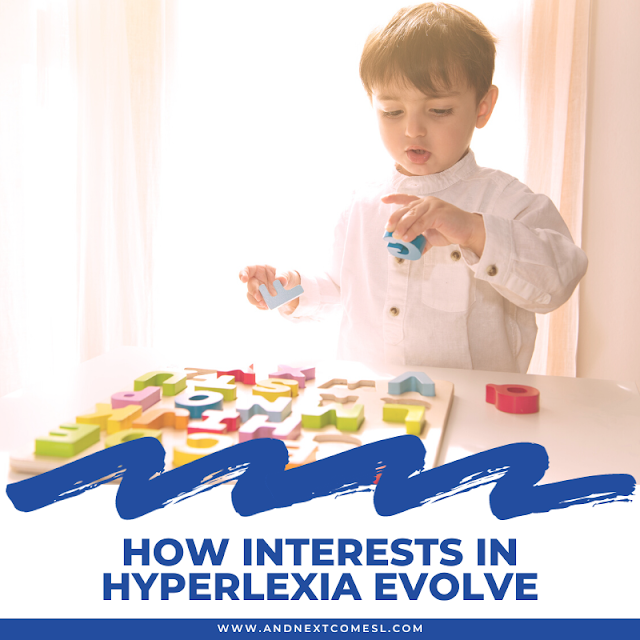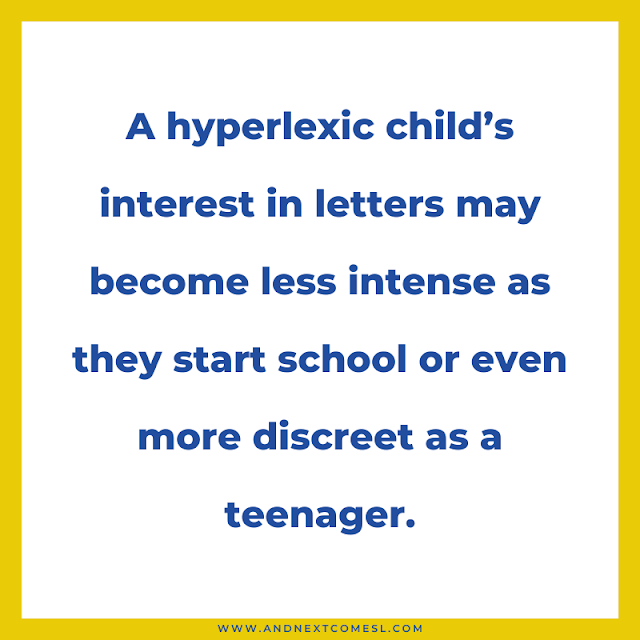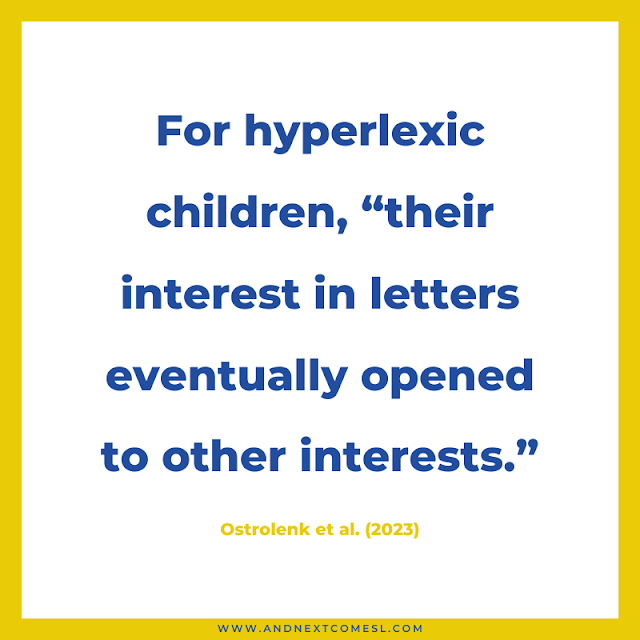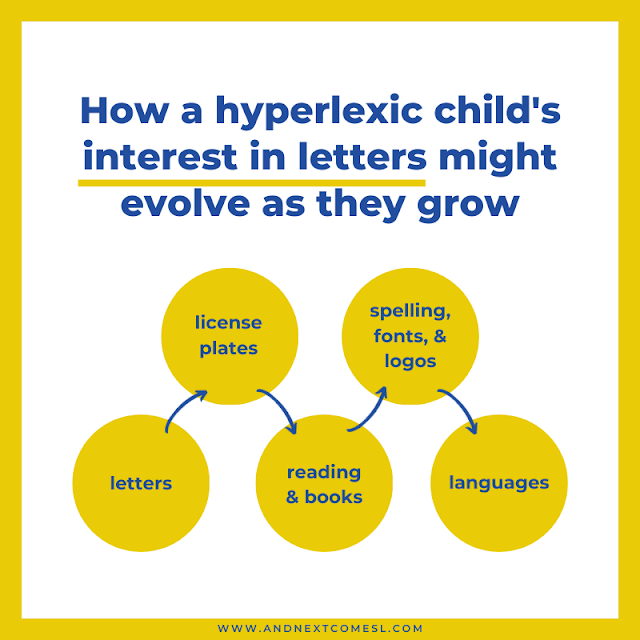It all started with letters, didn't it?
Then the next thing you know, your kid is fascinated with license plates, stopping to trace the letters on every plate they pass.
Then, out of nowhere, they start reading. And your mind is absolutely blown.
Then your floor constantly looks like a ransom note because there are words and phrases spelled out in colorful letter magnets everywhere. "Clean up" was a personal favorite of mine...
Or maybe your floor is covered in logos or brand names like Pixar and 20th Century Fox.
Or maybe they take a liking to fonts and could happily spend hours typing the same word in different fonts on your computer.
Then, before you know it, they're learning other languages and you can barely keep up. Russian. Arabic. Korean. All I can say is thank goodness for Google Translate!
The point here though is that a hyperlexic child's interests evolve and change as they grow. I know it might not seem like it when you're in the thick of the toddler and preschool years, but that interest in letters can be expanded upon. It eventually opens the door to new interests.
So, let's take a closer look at how interests in hyperlexia evolve and change. After all, as Susan Martins Miller so succinctly put it in the book Reading Too Soon, hyperlexic "interests change."
But First...Some Common Questions About Hyperlexic Interests
Over the years, I've seen variations of the following questions regarding hyperlexic interests:
- Will their interest in letters and numbers always be this intense?
- Do they ever outgrow this interest in letters?
- When will the interest in letters fade?
So I thought it would be helpful to address these common concerns first.
If you have a hyperlexic child, which I'm assuming you do if you're reading this, then you already know how intense and all-consuming the child's interests in letters can be. Especially in the early years where it's how most of these kids spend their time.
For instance, Ostrolenk et al. (2023) noted that "the mother estimated that this interest occupied 90% of both children's free time" and, honestly, I'd say that's pretty accurate. The other 10% is probably them sleeping while hanging onto a letter toy or dreaming about letters...
Now, will their interest in letters always be this intense or all-consuming? No, it likely won't. Obviously, all kids are different so it might remain intense for some, but, for most, the intensity of the letter interest wanes as their interests expand.
Perhaps you're also wondering if their future interests will always be this intense too. Well, not necessarily. For some, their interests might always be this intense, but in our experience, nothing was as intense as those toddler and preschool years when my son was at the height of the letter fascination period.
As for the second question, about outgrowing their interest in letters, the answer is not really. They will likely always have a love for letters and find letters comforting. As Ostrolenk et al. (2023) highlighted, "their interests had soothing abilities: singing the alphabet song could help calm the children when needed."
So, don't be surprised if, years from now, they return to those same interests, especially in moments of overwhelm or stress. After all, those interests have always brought them comfort and will always be highly appealing to them, whether they're 2, 8, 12, or 20 years old.
However, their interest in letters will likely evolve and expand, as we'll look at shortly. For instance, they might move from reciting the alphabet forwards and backwards, learning new alphabets, or organizing things in alphabetical order to things like learning a new language or an interest in fonts or calligraphy.
So, when does this interest in letters fade?
Well, like I said, the love for letters may still be there for years to come.
The interest, however, may become less intense, usually around the time they start elementary or primary school, or become even more discreet as a teenager.
Sometimes the interest might fade a bit when they start to learn to read. And sometimes it fades simply because they've moved on to new things or because they've learned how to mask their abilities and interests.
Regardless, it's important to remember that every hyperlexic child is different and there's no clear or fast answers to any of these questions.
However, the intensity and the topics of interest will change and evolve as the child grows. Yet, as the saying goes, you never forget your first love (in this case, letters).
A Look at How Interests in Hyperlexia Evolve & Change
The thing to note about a hyperlexic child's interests is that "their interest in letters eventually opened to other interests." (Ostrolenk et al., 2023) In other words, their first interest in letters essentially acts as a stepping stone for new interests.
For instance, their interest in letters might move into an interest in license plates and then an interest in books and reading. Then they might move to spelling, fonts, and logos. From there, they might move to learning different languages.
You can see from this example that hyperlexic "interests tended to become more complex; for example, an interest in books was added to their interest in letters." (Ostrolenk et al., 2023) What starts off simple, gets more complex.
It's also been shown that hyperlexic "interests expanded through their partial similarity with a previous interest." (Ostrolenk et al., 2023)
For example, letters and numbers are quite similar and are often grouped together. So it makes sense that many hyperlexic kids gravitate towards an interest in numbers after learning the alphabet. From there, their interests might move to counting, math, shapes, calculators, clocks, calendars and dates, Roman numerals, coding, and so on.
Sometimes a hyperlexic child's interests in letters and numbers expand to things that combine both of these interests. Think license plates, road signs, the periodic table, nutrition labels, and even music.
Speaking of music...Music is such a natural stepping stone for hyperlexic learners. Things like the musical alphabet, music symbols that are letters (e.g., f for forte), time signatures, rhythm, intervals, lyrics, etc. all lean into those interests in letters, numbers, and patterns. And yes, hyperlexic kids are drawn to patterns, in case you didn't know that.
It also makes sense that hyperlexic learners are drawn to music, given that they are gestalt language processors. As a result, they are naturally drawn to things like intonation, pitch, and musicality.
It's also worth noting that it's fairly common for hyperlexic learners to have perfect pitch. So, again, an interest in music is definitely a logical next step for many of these kids.
So, while letters are often the first interest, that interest expands and becomes more complex, branching into topics like math, music, and the periodic table. Just like we discussed.
As the hyperlexic child approaches the preteen and teenage years, you might notice interests such as console and video game history, Nintendo and Mario, coding, social justice, and animals (just to name a few). By the way, these are topics that other parents of older hyperlexic kids have shared with me, as well as ones from my experience with my hyperlexic son. So it's just a sampling of some of the possibilities.
Now, obviously it's worth noting that not all hyperlexic kids will move to all of these particular topics or in the order that I've listed them. Sometimes they're not always linear and sometimes interests develop concurrently.
Regardless, the above examples show you how those interests in letters could possibly evolve and change as the hyperlexic child grows.
It might also be worth reading through these common interests for hyperlexic kids, as I certainly didn't touch on all of these common interests here. I just covered some of the most prominent ones related to letters and numbers.
Final Notes on How Hyperlexic Interests Change as a Child Grows
Okay, I know that was a lot, so let's summarize what was discussed above:
- A hyperlexic child's first interest is letters and it's usually quite an intense interest.
- This interest in letters may fade as they grow older, becoming less intense or more discreet. Or it may fade as they start to learn to read or because they're learned how to mask their abilities and interests.
- Hyperlexic kids will likely always have a love for letters and find letters comforting so they may return to those same interests, especially in moments of overwhelm or stress.
- How an interest in letters might evolve: Letters ➡ License plates ➡ Books and reading ➡ Spelling, fonts, and logos ➡ Different languages
- How an interest in letters shifts to a number/math focus: Letters ➡ Numbers and counting ➡ Math and shapes ➡ Calculators, clocks, and calendars ➡ Roman numerals ➡ Coding
- How an interest in letters and numbers may combine into new interests: Letters and numbers ➡ License plates and road signs ➡ Periodic table and nutrition labels ➡ Music
- Not all hyperlexic kids will move to all of these particular topics or in the order that's listed. They are just some examples to show you that hyperlexic interests do evolve and change as the child grows.
I hope you found this information about how interests in hyperlexia evolve and change helpful.













